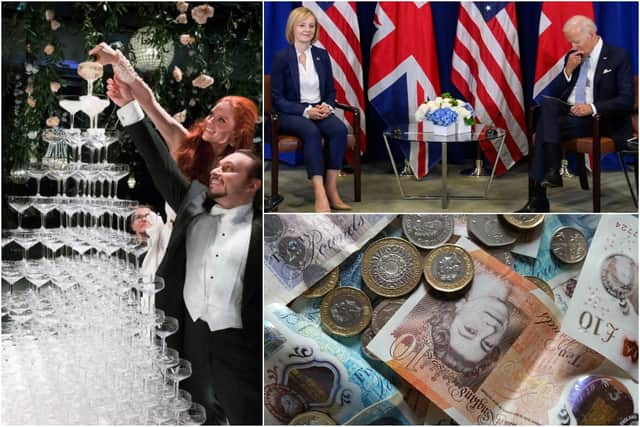Trickle down economics: meaning, does it work, what is Liz Truss’ tax cuts policy - what has Biden said?
and live on Freeview channel 276
Joe Biden and Liz Truss have held their first formal talks since the new UK Prime Minister came to power.
The meeting between the two world leaders was highly-anticipated, and with major issues such as the global economy, the war in Ukraine and Britain’s relationship with the EU, Biden and Truss had plenty to speak about.
Advertisement
Hide AdAdvertisement
Hide AdThe first meeting between the pair since Truss took on her new role was made all the more anticipated by a timely tweet from Joe Biden, in which he hit out at ‘trickle down economics’.
His comments came as the Prime Minister and Chancellor Kwasi Kwarteng finalise a mini-budget for Friday (23 September), which is expected to see previously planned increases in corporation tax scrapped and the hike in national insurance reversed, while also ending a curb on bankers’ bonuses.
But is that trickle-down economics, and what exactly is trickle-down economics in the first place?
Here is everything you need to know about it.
What is trickle down economics?
Trickle down economics is a theory in which it is argued that benefits (such as tax breaks) for corporations and the highest earners will eventually boost the wider economy.
Advertisement
Hide AdAdvertisement
Hide AdThis boost would theoretically then ‘trickle down’ to those lower in the economic chain, for example minimum wage workers, who would reap the benefits of the blossoming economy.
However, the theory and method has been criticised for widening the gap between the richer and the poorer in society, as those at the top end of earners will substantially grow their fortune by taking advantage of tax breaks and other benefits, while those at the bottom end have to wait to see an effect on their income, if any.
The term "trickle-down" was introduced by American humorist Will Rogers ,and today is often used to criticise economic policies that favour the wealthy or privileged while being framed as beneficial to the average citizen.


What did Truss and Biden say?
Truss - who won the Tory leadership contest by gaining the support of the party membership to be installed as Britain’s new prime minister - campaigned on the platform of tax breaks and being anti-windfall tax for energy companies.
Advertisement
Hide AdAdvertisement
Hide AdHer reasoning was that she wants to boost investment in Britain, and in turn boost the rapidly failing economy.
Ahead of their meeting, the US President tweeted: “I am sick and tired of trickle-down economics. It has never worked. We’re building an economy from the bottom up and middle out.”
The message was tweeted from the official POTUS Twitter account, and Twitter users were quick to jump to the conclusion that Biden was directly referring to Truss’s policy, or that his comments came suspiciously close to their meeting.
Truss’ spokesperson said that it is “ludicrous” to suggest that Biden was referring to Truss directly.
Advertisement
Hide AdAdvertisement
Hide AdThe Prime Minister’s official spokesman said: “Any suggestion that it’s in some way a direct criticism of UK policy would be ludicrous. No two countries’ economies are structured in the same way, each has unique challenges.”
Truss has said: “We have to look at our tax rates. So corporation tax needs to be competitive with other countries so that we can attract that investment,” indicating that she was also willing to review all tax rates including income tax.
She added: “Lower taxes lead to economic growth, there is no doubt in my mind about that.”
But Foreign Office minister Gillian Keegan has denied that the Government’s policy of cutting taxes to try to boost growth can be defined as “trickle-down economics”.
Advertisement
Hide AdAdvertisement
Hide AdAsked about Biden’s tweet criticising the economic theory, she told BBC Breakfast: “That wasn’t actually a message, we don’t believe, which is based on our economy…
“You cannot say what we’ve done is trickle-down economics. You know, we’ve just put a massive [energy bills support] package in place, which the Chancellor will outline the cost of that, and how we’re going to deal with that.
“But it is massive, the package we put in place to make sure that we support people at this time.
“So, if you look at the definition of trickle-down economics, that definitely does not fit it.” She added: “There’s no way you could describe our approach as trickle-down.”
Comment Guidelines
National World encourages reader discussion on our stories. User feedback, insights and back-and-forth exchanges add a rich layer of context to reporting. Please review our Community Guidelines before commenting.
